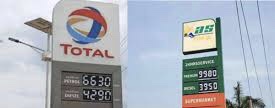The Government Assurance and Implementation Committee has questioned the Ministries of Energy and Trade over their failure to curb the skyrocketing fuel prices.
The committee whose role is to scrutinize the assurances, promises and undertakings by the government was on Wednesday, 13, meeting officials from the two ministries over their pledge to stabilize fuel prices.
The committee members tasked officials from the two ministries to explain the failure to implement a promise they made in the House on high fuel prices in February this year.
While presenting a statement on the high fuel prices in April 2022 both the State Minister for Industry, Hon. David Bahati and the State Minister for Minerals, Hon. Peter Lokeris, said that government would take punitive action including revocation of trade licenses against dealers found hoarding fuel and taking advantage to increase prices.
The Government also pledged to organize the dealers and stakeholders in the petroleum industry to discuss a way forward on the high costs by forming an association.
However, when tasked by the committee chaired by Joseph Ssewungu to explain if they had issued any punitive measures, the Ministry of Energy officials led by Lokeris, and Permanent Secretary Pauline Batebe went silent.
The State Minister for Trade, Hon. Harriet Ntabazi said it was not her decision to make.
“You said if pump prices were escalated by the dealers, you will close them. How many have you closed so far? ”You did not even help the fuel dealers form associations to stabilize the fuel prices as you promised,” Ssewungu added.
Ntabazi said that the proposal to shut down fuel stations or revoke their licenses which was communicated in the House was arrived at after a meeting of the inter-ministerial committee chaired by the Prime Minister and that the final decision would still come from there.
Members of Parliament said that different fuel stations were hoarding fuel while others had excessively increased fuel prices.
According to Hon. Connie Galiwango, the Mbale City Woman MP, the fuel prices are different almost in all districts while in other places people are hoarding fuel.
“In Tanzania, when you go to a petrol station in Mwanza, it has the same price as you go to Dar-es-Salaam. However in Uganda, everybody has their price, are we in charge? How will we stop the exploitation of Ugandans,” she asked.
Ssewungu added that some big petrol dealers are reselling fuel to the small ones and people are making a lot of money.
“Fuel increases every month and it is almost Shs1,000 every month; by December, it could go to Shs12,000,” Ssewungu added.
Agago District Woman MP, Hon. Beatrice Akello Akori said countries like South Sudan and DRC Congo which also import fuel from the same inlets as Uganda have cheaper fuel prices and yet they have longer routes compared to Uganda.
This was in response to a statement by the officials from the Ministry of Energy that transport costs of bringing fuel to Uganda and subsidies in other countries make the cost of fuel look high.
Hon. Florence Kabugho, the Kasese District Woman Representative questioned why Ministry officials were saying fuel supply is stable and yet prices remain high.
The Permanent Secretary, Pauline Batebe said that their focus is to ensure a steady flow of fuel since the worst situation could be a total absence of fuel in the country.
According to Batebe, the Uganda National Oil Company has ordered for eight million litres using trade finance instruments with support from the finance ministry.
This is meant to support the industry efforts to have sufficient stocks in the country ahead of the upcoming Kenyan elections.
Uganda consumes about six million litres of fuel daily.










